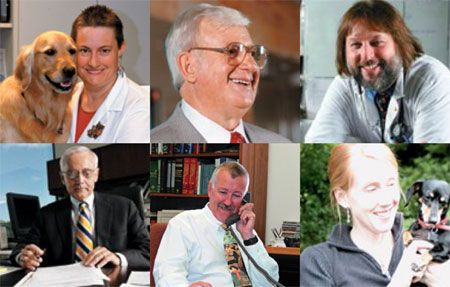A look back at forward thinkers
What changes do you hope will occur in veterinary medicine in the next 100 years? What is your sci-fi prediction for the field? Lets look back at how top veterinarians answered these questions 10 years ago and then get to work on making these hopes and predictions a reality!

Clockwise from top left corner: Dr. Robin Downing, Dr. Charles Short, Dr. Joe Bartges, Dr. Jacqueline Neilson, Dr. Stephen Withrow and Dr. Lonnie KingAround 10 years ago, we asked some of veterinary medicine's top thinkers to tell us what changes they hope will occur in the next 100 years, as well as their sci-fi predictions for the future. Some of our favorite answers are below. We still have still have 90 years to make the hopes in the first list a reality, so let's get cracking!
*Click on the names to read the full interviews.
What changes in veterinary medicine do you hope will occur in the next 100 years?
Mandatory reporting of suspected animal cruelty cases by all states, which is what is required of our human medicine counterparts. We should see this in the next few years, not 100. Melinda D. Merck, DVM
Bold stances in the arena of animal welfare, such as outlawing cosmetic surgical procedures. Jacqueline C. Neilson, DVM, DACVB
Universal health insurance for people and pets to take away the decisions dictated by dollars. Stephen J. Withrow, DVM, DACVS, DACVIM (oncology)
Genetically improved animals with greater resistance to disease and databases and warning systems to reduce or prevent the spread of diseases internationally. Charles E. Short, DVM, MS, PhD, DACVA, DECVA
Publicly funded veterinary clinics for ANY client who cannot afford to pay and the integration of shelter medicine, anticruelty training, and behavior into the curriculum of every veterinary college. Lila Miller, DVM
A new specialty veterinary field as we push into the 22nd century and inhabit space and other planets with our pets. Lonnie J. King, DVM, DACVPM
A cure for canine cancer and other genetically driven diseases. Robin Downing, DVM, MS, DAAPM, DACVSMR, CVPP, CCRP
Therapies tailored to unique genetic profiles. Patricia N. Olson, DVM, PhD
Read on for sci-fi predictions!
What is your sci–fi prediction for veterinary medicine?
We will be able to hook animals up to a machine that reads their thoughts. Jacqueline C. Neilson, DVM, DACVB
As a result of advances in nutrition, pharmacology, and gene therapy, invasive surgery to remove urinary stones will be eliminated and, thus, become an item of historic interest. Carl A. Osborne, DVM, PhD, DACVIM
We will have a Dr. McCoy tricorder that we can wave over our patients to arrive at a diagnosis and to provide treatment, and perhaps even the ability to alter the genetic basis of disease. Joe Bartges, DVM, PhD, DACVIM, DACVN
We will discover the genetic code for every phenotypic trait of every animal species: what makes a claw, a finger, a hoof, an arm, a wing, etc. We will then use this knowledge to engineer new animals and to recreate species that have long been extinct. Niels C. Pedersen, DVM, PhD
Food will be produced through the fusion of nanoelements, rendering crops and food animals irrelevant. Lonnie J. King, DVM, DACVPM
An animal protein will be produced in vitro, allowing us to eat meat without the ethical conflicts posed by the animal production industry. Jane Armstrong, DVM, MS, MBA, DACVIM